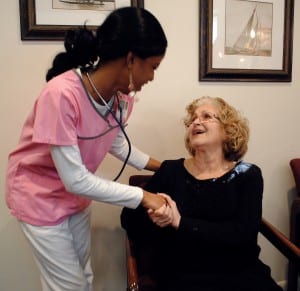 In-home care and assisted living facilities has been an increasing segment of elder care in the past decade. Approximately more than 1.8 million people live in nursing homes today and will gradually decrease in years to come. Statistics have shown a slight decrease in the number of seniors living in nursing homes for every year that goes by and medicine seems to play a major role for these results. The improved health of seniors, more choices for the elderly and the rising costs of health care today all contribute to this new trend.
In-home care and assisted living facilities has been an increasing segment of elder care in the past decade. Approximately more than 1.8 million people live in nursing homes today and will gradually decrease in years to come. Statistics have shown a slight decrease in the number of seniors living in nursing homes for every year that goes by and medicine seems to play a major role for these results. The improved health of seniors, more choices for the elderly and the rising costs of health care today all contribute to this new trend.
Elder care is of the utmost concern now as 79 million baby boomers turn 60 and over. Of course, the preference both personally and financially is to remain at home as long as possible.
Many elderly people today have managed to remain living in their homes with community support services and these systems are becoming a worldwide trend as populations age. Adult children seek viable and reasonable choices for taking care of their elderly parents. As such, home care is the most flexible choice. There are many community support system options for your older loved one including:
Adult Day Care: is non-medical care with community based programming to meet the needs of adults with disabilities
Chore and Personal Care Assistance: Service is provided by individuals to elderly people who need help to maintain independent life. Personal care offers assistance to maintain bodily hygiene, safety and daily activities for every-day life. A personal care assistant can do what your elderly loved one can’t.
Care Management: Helps clients gain access to waiver and other local services. Care managers are responsible for ongoing monitoring of the clients plan of care and oversee the process of the level of care.
Housing Assistance: Includes provision of physical devices, emergency assistance situations that require relocation.
Meal Services: Includes meals that are served and delivered to the house.
Protective Supervision: Provides supervision to people in their homes that have weak and frail or may suffer a medical emergency.
Respite: Supervision and care for a loved one while the family takes a short-term relief or respite.
Social Services: Social reassurance/ friendly is able to visit, group or individual counseling, and money management.
Transportation: Offers access around the community and special events for clients who don’t own transportation.
For more information contact Safe Harbor at 718-979-6900
